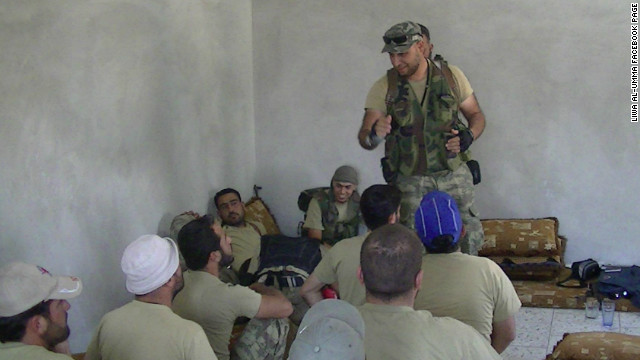FLC
'Libyan Mahdi al-Harati of the US State Department, United Nations, and the UK Home Office -listed terrorist organization, the Libyan Islamic Fighting Group (LIFG) in Syria'
[AbuM] "... The indirect approach with proxies, as with client or partner states, tries to obfuscate or eliminate a fundamental policy problem with a different strategic execution. Few would claim they wish to engage in nation-building in Syria, or advocate launching a counterinsurgency or counter-terrorism campaign there. To do so would evoke images and memories of Iraq and Afghanistan, of thousands of American troops and strategic folly.But trying to create a friendly state or quasi-state out of the Free Syrian Army through supplying them with weapons requires precisely them to execute policies we would rather leave unspoken. When we look at the aftermath of the Benghazi attack, we recognize that a Libyan government which effectively translates its pro-U.S. proclivities into meaningful policy outcomes will have to engage in counter-terrorism operations against jihadists. It will need to undergo nation-building efforts to develop a military powerful enough to take on militias and other paramilitary organizations, and develop criminal justice institutions and practices to ensure that the rule of law can prevail.In Syria, we frequently hear that providing arms to the rebels will enhance U.S. goals to unify the opposition, marginalize jihadists such as Jabhat al-Nusrah which operate outside the FSA’s already loose command structure, and earn the loyalty of the future government in Syria. This would occur, supposedly, through the U.S. preventing Qatar or Saudi Arabia from taking control of arms flows, outgunning the jihadists, and collapsing the Syrian regime before they can establish a foothold within the country.For U.S. patronage to translate into those outcomes, though, the U.S. must induce some nasty behavior by its friends on the ground. It should be very obvious that Qatar and Saudi Arabia will search for preferred proxies. As recent reporting reveals, the Qatari and Saudi governments are trying to steer arms towards hard-line Islamists, and rebel groups, in turn, are shifting their behavior and appearance to cash into these arms. One the one hand, this is heartening, as it means that alternate arms provision might at least discourage aping hard-line Islamist or jihadist practices. But these faux jihadists are hardly the real concern.If the U.S. seeks out groups it believes align with its values, this encourages the Saudis and Qataris to more aggressively support their own proxies, in order to maintain leverage among the rebel co-belligerents. It is entirely possible to have a scenario where aggressive patronage produces unity within each patron’s preferred factions of the rebel forces, but creates starker divide among the coalition overall. As much as the United States would like to disassociate itself from the concept, using proxies to shape political outcomes and state consolidation is still a form of nation or state-building behavior, one made palatable by the lack of direct exposure but all the more difficult by the lack of leverage.Frequently, the first impulse of a proxy group, whether it takes arms or not, is going to focus using them on fighting its primary enemy (the Syrian state) rather than asserting dominance over fighters who are driving at similar aims. When relatively moderate rebels killed an extremist leader, it was not because he was initially unwelcome, but because he was trying to assert control over rebel activities.****************** Attempting to marginalize the jihadists sounds well and good, but it involves engaging in a severe and likely violent power struggle that jeopardizes the interests of several major regional state and non-state actors engaged in the Syrian civil war and its broader proxy conflict.****************So the United States is left with a situation where it must potentially fracture the rebellion by attempting this marginalization during the course of the conflict, or by hoping its arms have bought enough loyalty, capacity, and willpower for the rebel groups to undertake a second or third phase of Syria’s civil war in order to purge the country of jihadist groups. In either case, U.S. anti-extremist efforts work at cross-purposes with either unifying the rebels or shortening the civil war. This is doubly problematic when one considers that Saudi Arabia, Qatar, and other Gulf states have demonstrated their ability to resource and implement proxy strategies in countries such as Libya. Even in the case of Syria, the United States would need the support of the very countries propagating the movements it hopes to quash.When the U.S. engages in proxy warfare in the context of the Syrian civil war, it thus encounters not simply implementation problems, but these implementation problems, like those of partner and client strategies, reveal a fundamental lack of ability to prioritize policy aims. Advocates of proxy warfare cannot decide or agree about their policy objectives, let alone their prioritization. It is nice to say that the U.S. wishes to shorten the Syrian war, build opposition unity, protect safe areas, and marginalize radicalism. These goals all conflict at various junctures (shorten the Syrian civil war requires minimizing infighting among rebels or killing off undesired rebels postwar), and without prioritization, the result is a mess..."

No comments:
Post a Comment